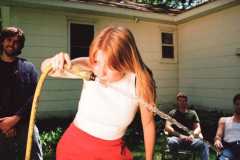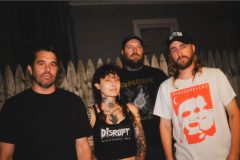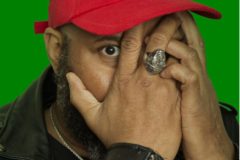Heavily swayed by our thoughts, feelings, and experiences during the day or further, dreams can reflect our aspirations, ideals, purpose, desires, and fears. Chessa Rich has been a vivid dreamer throughout her life, which she says is the truest well of creativity and imagination for her. She also mentioned that she looks at her experiences with dreaming as the most of her day.
The North Carolina-based singer/songwriter/multi-instrumentalist recently found out that an undiagnosed sleeping disorder has affected her health, causing Rich to have her breathing be interrupted throughout the night. The alignment has involved many of Rich in other areas of her life – including being productive, staying creative, and having her dreams disrupted. The life-changing diagnosis became the center point for Rich’s album Deeper Sleeper (Sleepy Cat Records), out now.
“Each song on this record reflects a different aspect of my relationship with sleeping and dreaming,” said Rich in her bio. “Some were born in frustration and anger at a body that won’t do what I want it to do, others sound more like giving up, and one is a literal retelling of a dream I had…Pieces of the songs on Deeper Sleeper have been floating around with me like dreams for a while, and like dreams, I had to patiently sit with them to let them become what they needed to be.”
You began your passion for music at an early age. What do you remember about those days?
My first musical memories are singing in the car with my parents. There was a lot of Eagles, Extreme, Don Henley, and Eva Cassidy. That’s where I learned to sing harmonies, listening to my mom sing them or hearing a song so many times I wanted to figure out another part to sing. I also have such vivid memories of getting CDs for Christmas in middle school and getting SO excited to listen to them in the car on the way to my grandparents’ house on Christmas Day and then in my room on my boombox. I have a vivid memory of listening to Third Eye Blind’s first record on a long car trip singing in the backseat and specifically thinking how cool it was that my parents were okay with us listening to that a couple of times through on that drive. And then, in 8th grade, my uncle gave me a set of fifteen bootlegged live Radiohead CDs, and I ate that stuff up!
You spent some time up in Spain working there. What did you do there?
In Spain, I was an “auxiliary de conversación,” which is a program paid for by the Spanish government that puts native English-speaking college graduates in bilingual schools as language assistants. I worked for 13 hours a week as an English language assistant (think “English time with Chessa” once a week in every elementary school class) and had a really good time the rest of the week. I lived in beach towns for both years, and it was just what I needed after being an over-achieving high school and college student.
Being outside your comfort zone had to be invigorating. Was it for you?
Being outside my comfort zone creatively is wild!!! I get so amped up on adrenaline and nerves, and my body feels totally different. My energy starts coming from some other place. I knew this recording process was going to be really new and kind of scary, so I did a lot of emotional and spiritual work to try and ground myself before going up there. I worked really hard to stay in the moment and have a light touch with everything. Lucky for me, I was there with a handful of my best friends, so I felt supported by them every step of the way. It sounds really corny and cliché, but every day really was an exciting new journey that I got to go on with them.
I read in your bio that you were at one point writing songs on every piano you came across, which became skeletons for Deeper Sleeper. Did you discover some that wouldn’t fit the vibe you were wanting?
There were a couple of piano things that didn’t make the record, but almost all of it made it in. While I was writing the songs, I wasn’t at all thinking about it if they’d fit in a record or what kind of vibe I was going for. When I write, I’m just sort of letting whatever happens happen, and then later, I’ll go back and see what pieces feel like they go together. “Red Sky” was the real doozy in terms of writing; that one went through so many versions, and several previously-existing sections of it were cut in the process. I feel like I was actively working on that song for three years. I always knew it was going to be epic and wasn’t satisfied to finish it until I felt like I could do the song justice by giving it all the lyrics and transitions it deserved.
Which piano was your favorite?
This is like asking me to choose between my children! There are so many factors to consider here; how it sounds, what physical environment it is in, and what I happened to write on it. I will say one of my favorite-sounding pianos was in a rental house that I moved into after Jenn Wasner (of Wye Oak and Flock of Dimes) moved out. This other band, Eric and Erica, had lived there before, and I think it was their piano. I think Jenn and Andy had recorded some of the Wye Oak piano versions of stuff on it. It was in this kind of cul-de-sac neighborhood of completely dilapidated rental houses where a bunch of musicians lived at the time. It was so WARM and really percussive in the low end, like a really deep banjo. It influenced how I wrote; I ended up writing all this fun, rhythmic, plinky stuff on it. And it held tune so well. I felt like it was right to leave that piano in the house when I moved out, and I really miss it. There was also this beautiful Steinway in a small performance space at Wildacres Retreat Center that was a real joy to play. It was often being used, so when I got to be alone in there, it was really special. Incredible dynamic range and a room built to hold and move the sound exactly how you want it to. I don’t think I actually wrote anything that ended up on the record on it, but I remember some great times with it.
When did it become apparent that you needed to see someone about your sleeping issues?
Honestly, I should have seen someone about my sleeping issues way before I did! My boyfriend had been telling me for YEARS that I should get a sleep test for many reasons, including that both my dad and grandma were diagnosed with sleep apnea and had gotten relief from using a CPAP machine. I had kind of accepted that I was going to be really tired my whole life, and I also thought everyone else was just as tired but doing a better job at pushing through than me. Terrible thing to do to yourself! Do not recommend that thought process. I ended up going to the doctor about it just so my boyfriend would stop bugging me about it. I was so skeptical, and then the sleep test results came back, and I’d had 78 apneas in 5 hours, which is insane.
When you began getting your sleeping habits back to being healthy, how quickly did you start to notice how it also affected the work on your music?
The timing of getting my CPAP was interesting because I got it right around the time I was starting to do all the record-release prep stuff. Having an almost full-time job and doing all the behind-the-scenes work of putting out a record doesn’t leave a ton of time to be writing new material, which bummed me out. Also, when I was in the process of getting the CPAP, everyone told me it would be totally life-changing; I’d have so much energy, “You’re not going to believe how tired you used to be!” Unfortunately, this has not been my experience. I am definitely getting more restful sleep, but I haven’t magically transformed into some hyper-productive human who is full of energy all the time. I just need a lot of sleep, and it’s been a slow process of becoming okay with that. However, even just getting the diagnosis and realizing that I’m not lazy or somehow defective has been helping me be kinder to myself. It’s always easier to make art when I’m being nicer to myself. I have yet to make a good thing from forcing and berating myself into doing it.
The list is seemingly a mile long on influences I hear on Deeper Sleeper. Who were some that you tapped into during the process?
I made a “production notes” playlist for Shane when we first decided to make this record together. There was a lot of SZA on it, some Radiohead and Big Thief. I admire Adrianne Lenker so much, and some of those recordings were a reference point in terms of letting some of the more acoustic-leaning songs breathe some. SZA’s first record, “Ctrl,” was a huge reference point in terms of electronic sounds as well. I don’t think any of this record ended up sounding like her at all, but those songs are some that feel like they’re a part of my cellular makeup at this point, and she’s such a huge singing inspiration of mine.
You recorded the tracks back in 2021, right amid the pandemic. What was that time like with everyone being in the studio?
Oh man, recording in March of 2021 was wild. We had all gotten our first doses of the vaccine right before heading up, some folks the literal day before. It was still such a scary time because the vaccine was so new, and we still knew so little. There was definitely some extra stress around testing/vaccines/safety, but everyone communicated well about it, and thankfully no one got sick. We had all the windows open any time we were with anyone outside our little bubble. It felt like such a balm being around people and making music again. It was one of the first times any of us had done it since the first outbreak. I was so grateful we were able to make it happen.
How difficult was it sometimes to recount some of the dreams you had to bring to paper?
I rarely have problems remembering my dreams. They are generally all right there for me when I wake up, it’s just a matter of retelling them to myself a couple of times before I get out of bed, and then I’ve got them. I’ve found that if I tell someone the dream or even just voice-record it, I’ll remember it pretty much forever. Or at least to the point that if I get a small detail, it will all come back. I don’t write them down every day because I’m not always able to make the time, but the really poignant or symbolic ones get recorded one way or another.
Photo Courtesy: Chris Frisina









Social Media